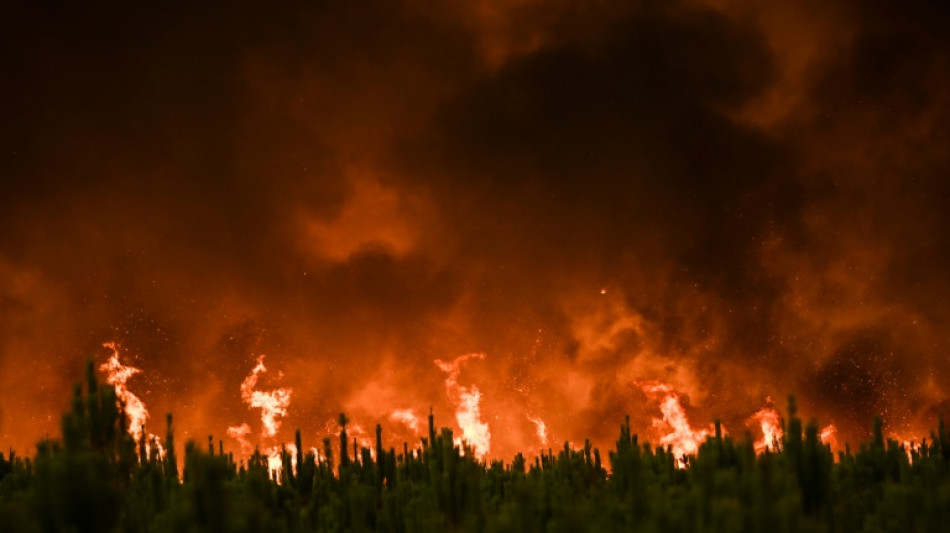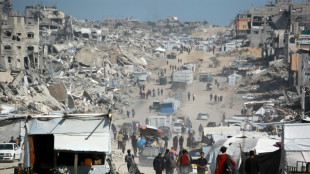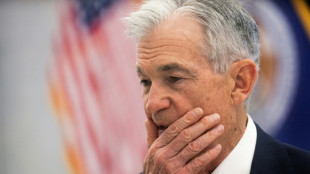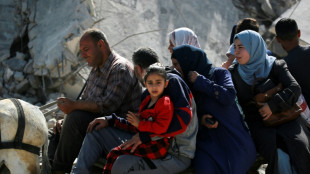
-
 Rescuers say 100 dead as Israel launches fresh Gaza offensive
Rescuers say 100 dead as Israel launches fresh Gaza offensive
-
Arab League to meet in Baghdad to discuss regional crises

-
 'Alpha predator' sharks and humans clash on an Israeli beach
'Alpha predator' sharks and humans clash on an Israeli beach
-
Lights, cameras, action at Eurovision Song Contest final

-
 Crusaders hail O'Connor as Wallabies trump card in Lions series
Crusaders hail O'Connor as Wallabies trump card in Lions series
-
Musk's xAI blames 'unauthorized' tweak for 'white genocide' posts

-
 Sean 'Diddy' Combs trial: Takeaways from first week of testimony
Sean 'Diddy' Combs trial: Takeaways from first week of testimony
-
Manhunt in US tourist hub New Orleans after 10 escape jail

-
 Vegas clings to PGA lead as Kim, Scheffler charge
Vegas clings to PGA lead as Kim, Scheffler charge
-
US loses last triple-A credit rating as Moody's cuts over govt debt

-
 Trump blasts Supreme Court over block on deportations
Trump blasts Supreme Court over block on deportations
-
US loses last triple-A credit rating as Moody's cuts on growing govt debt

-
 Lyon win fourth French women's crown in a row
Lyon win fourth French women's crown in a row
-
Joaquin Phoenix stars in Covid-era thriller set in 'sick' America

-
 US Supreme Court blocks Trump bid to resume Venezuelan deportations
US Supreme Court blocks Trump bid to resume Venezuelan deportations
-
Arteta ready to smash Arsenal transfer budget to sign striker

-
 Combs's ex Cassie wraps grim week of testimony
Combs's ex Cassie wraps grim week of testimony
-
Trump reshapes US Mideast policy. Can deals work instead?

-
 US approves first blood test for Alzheimer's
US approves first blood test for Alzheimer's
-
Vegas hits the jackpot with surge to the top at PGA

-
 Cucurella steers Chelsea towards the Champions League in Man Utd win
Cucurella steers Chelsea towards the Champions League in Man Utd win
-
Sinner lines up Alcaraz showdown in Italian Open final

-
 US stocks add to weekly gains amid trade deal optimism
US stocks add to weekly gains amid trade deal optimism
-
Sinner reaches Italian Open final and Alcaraz showdown

-
 US considering reality TV competition for citizenship
US considering reality TV competition for citizenship
-
France's Pavon delivers career major low 65 to contend at PGA

-
 Villa sink Spurs to bolster bid to reach Champions League
Villa sink Spurs to bolster bid to reach Champions League
-
Extra work, new caddie has Homa achieving major feats at PGA

-
 Gaza rescuers say Israeli strikes kill 100 as Hamas makes a plea to lift blockade
Gaza rescuers say Israeli strikes kill 100 as Hamas makes a plea to lift blockade
-
Salah slams 'harsh' Liverpool fans for jeering Alexander-Arnold

-
 Vegas closes with double bogey but still leads by two at PGA
Vegas closes with double bogey but still leads by two at PGA
-
US Fed plans to cut workforce by 10% in next 'couple of years'

-
 European leaders seek united front with Trump on Ukraine
European leaders seek united front with Trump on Ukraine
-
NWSL says should have stopped game after King collapse

-
 Ravers revel in Cannes spotlight with thumping 'Sirat'
Ravers revel in Cannes spotlight with thumping 'Sirat'
-
'Fortnite' unavailable on Apple devices worldwide

-
 Combs's ex Cassie takes witness stand for fourth day
Combs's ex Cassie takes witness stand for fourth day
-
Fraser-Pryce beaten by Jamaican starlet Tia Clayton in Doha

-
 Ayuso climbs to Giro stage seven win, Roglic takes overall lead
Ayuso climbs to Giro stage seven win, Roglic takes overall lead
-
EU tech chief urges US cooperation as key decisions near

-
 UN rights chief warns of 'ethnic cleansing' in Gaza
UN rights chief warns of 'ethnic cleansing' in Gaza
-
Piastri beats Norris again in McLaren's second 1-2 in practice at Imola

-
 ICC prosecutor, under investigation, steps aside temporarily
ICC prosecutor, under investigation, steps aside temporarily
-
German female-led 'folk-horror' early favourite in Cannes

-
 Gaza rescuers say Israeli strikes kill 88 as Hamas makes a plea to lift blockade
Gaza rescuers say Israeli strikes kill 88 as Hamas makes a plea to lift blockade
-
Trump family hotel project in Serbia in doubt after forgery probe

-
 Alcaraz reaches Italian Open final and potential Sinner showdown
Alcaraz reaches Italian Open final and potential Sinner showdown
-
Venezuelan Vegas makes turn with two-stroke lead at PGA

-
 Trump insults Springsteen, Swift from Air Force One
Trump insults Springsteen, Swift from Air Force One
-
Ayuso wins on Giro mountain, Roglic takes overall lead


Climate change driving unprecedented forest fire loss
Forest fires supercharged by climate change are burning twice as much global tree cover as 20 years ago, according to a data Wednesday showing the equivalent of 16 football pitches are now lost every minute.
The research showed in unprecedented detail how wildfires have progressed over the past two decades, with the blazes claiming an estimated three more million hectares each year -- an area the size of Belgium -- compared with 2001.
The study showed that the majority of tree cover loss is occurring in the boreal forests that blanket much of Russia, Canada and Alaska, which are among the largest storers of carbon on Earth.
Researchers from the University of Maryland used satellite imagery to map areas of tree cover lost, including that burned by what are known as stand-replacing forest fires.
These are fires that kill all or most of the forest's canopy and which cause long-term changes to forest structure and soil chemistry.
The data showed 2021 to be one of the worst years for forest fires since the turn of the century, causing 9.3 million hectares of tree cover loss globally.
That was more than a third of all the forest lost last year, according to the data, compiled by Global Forest Watch and the World Resources Institute research group.
"Forest fires are getting worse worldwide," James McCarthy, research analyst at Global Forest Watch, told AFP.
The European Union's satellite monitoring service said last week that western Europe had experienced record fire activity so far in 2022, with tens of thousands of hectares of forest lost in France, Spain and Portugal.
The researchers said that climate change was likely a "major driver" in increased fire activity, with extreme heat waves that render forests tinder dry already five times more likely today than a century and a half ago.
These drier conditions lead to higher emissions from fires, further exacerbating climate change as part of a "fire-climate feedback loop", they said.
- 'Best defence' -
The vast majority -- some 70 percent -- of fire-related tree cover loss over the last two decades occurred in boreal regions, likely because high-latitude regions are warming at a faster rate than the rest of the planet.
Last year, Russia lost 5.4 million hectares of tree cover due to fires, the highest on record at an increase of 31 percent over 2020.
"This record-breaking loss was due in part to prolonged heatwaves that would have been practically impossible without human-induced climate change," said the study.
The team warned that increased changes to climate and fire activity could eventually turn boreal forests from a carbon sink into a source for carbon emissions.
"In these boreal regions carbon has accumulated in the soil over hundreds of years and has been protected by a moist layer on top," said McCarthy.
"These more frequent and serious fires are burning off this top layer and it's exposing that carbon in the soil."
This century, fire-related tree cover loss in the tropics has increased round five percent -- some 36,000 hectares -- a year, the study showed.
Fire is not the principal cause of forest loss in these regions, with deforestation and forest degradation the main drivers.
But the researchers said that forest loss from deforestation was making it more likely that forests would be lost to fire, as the practice leads to higher regional temperatures and drier vegetation.
They called on governments to improve forest resilience by ending deforestation and limiting local forest management practices that include controlled burning, which can easily burn out of control particularly during dry spells.
"Forests are one of the best defences we have against climate change," said McCarthy.
O.M.Souza--AMWN